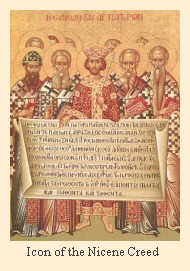The Whole Faith
The council of Nicea, authors of The Nicene Creed
There is a post quite worth reading at Glory to God for All Good Things, the blog of Father Stephen, an Orthodox priest in East Teneessee. He wrote How Much is too little? How much is enough? in which he teaches that all of Jesus' acts in Salvation History are essential parts of the story of our faith. He rightly contends that Jesus' descent among the dead and his ascension are as important to our salvation as his death on the cross.
This is not a typical Bible Belt statement of faith, but he is right. This is the faith we affirm each week in the Nicene Creed and at each baptism in the Apostle's Creed. This is the whole faith of the church through the centuries. Father Stephen writes in part,
Actually writing or summarizing the teaching of the Church in which all of the major events in the story of our salvation are given their proper weight is a minimal requirement if one is actually to be or become an Orthodox Christian. What is it about the Descent into Hades that is necessary to our salvation? What is it about the Resurrection that is essential to our salvation? What does the Ascension have to do with being saved (and it does)? What does the second and glorious coming of Christ have to do with our salvation? What does being born of a Virgin have to do with Christ’s saving of mankind?What he teaches here fits both with the teaching of the New Testament and the witness of the earliest Christian writers (those writing before Constantine's converting the Roman Empire to Christianity beginiing in 323). The full text of his rather long post is online here How Much is too little? How much is enough?
In Orthodox understanding, all of these things are integral parts of Christ becoming what we are in order to make us what He is. The metaphor of the substitutionary atonement, though not unknown, is simply too thin and weak to bear the full weight of the story of our salvation. Christ became fully human, that we might have a share in His divinity. It was into the depths of our humanity that He descended when He entered the Virgin’s womb, having done no damage to the freedom that belongs to mankind.It was into the depths of our damnation that He descended, when, dying on the Cross, He entered Hades and loosed the bonds of the captives. Now there is no where we may go that He has not filled with Himself. It was still in glorified union with our humanity that He rose from the grave, having trampled down death by death. It is our humanity that he bore (”like a yoke” we sang last night) into the very heavens themselves and in that union sat our humanity down at the right hand of the Father.
These actions, all primary statements in the Apostles’ and Nicene Creeds, not only provide a summary of the events in the life of Christ - they are the utterly essential elements of our salvation. As the Creed states: “…who for us men and for our salvation came down from heaven…”
All that Christ did is and should be an integral part of any proper account of Christian salvation. They should thus be integral parts of the worship and prayer life of the Church. Where they have been relegated to some lesser status - there you may be sure that some essential part of our faith has been laid aside and remains in danger of ceasing to be part of the Christian faith - except for the fact that it will remain a part of Scripture.
 His post shows why we have a church year celebrating the fullness of Jesus' life and ministry from before creation through the end of time. Christmas, for example, is not a time for remebering Jesus died for our sins. It is a time for remembering Immanuel, that in Jesus God is with us. Pentecost is not a time for remembering that Jesus died for our sins, but a day for giving thanks for the gift of the Holy Spirit to the apostles and others there that day.
His post shows why we have a church year celebrating the fullness of Jesus' life and ministry from before creation through the end of time. Christmas, for example, is not a time for remebering Jesus died for our sins. It is a time for remembering Immanuel, that in Jesus God is with us. Pentecost is not a time for remembering that Jesus died for our sins, but a day for giving thanks for the gift of the Holy Spirit to the apostles and others there that day. The creeds do limit us, taking away the fullness of what we find in scripture. The creeds present the faith of the early church (the Apostle's Creed was written before 150 a.d.) in a way that points us back to scripture to find more of the fullness of what is contained there.
Yes, Jesus died for our sins and yes that is an essential part of our Christian faith, but it is not the only essential part of our faith.
The whole faith passed on to us by the saints who came before us is that which we saints are to pass on to our children and those who follow us in following Christ. This is part of why I found my way into a liturgic churches where the whole story of the faith is told each week in the liturgy as we recall his death, resurrection and ascension knowing that Christ has died, Christ is risen and Christ will come again. What do you think?
peace,
Frank+
The Rev. Frank Logue, Pastor







<< Home